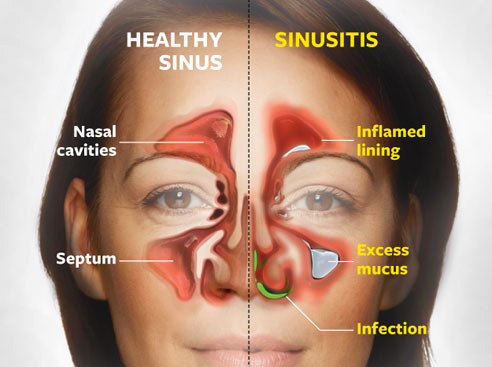
Have you ever had a sinus infection?
Over 24 million people every year suffer from sinus infections in the United States alone, and the effects can be debilitating. Symptoms can include fever, pain around the nose or eyes, a persistent headache, facial pain and tenderness, and a blocked, congested or runny nose. This condition is called sinusitis, and can often be exacerbated by an cold, the flu, or allergies. With chronic sinusitis, however, the sinus symptoms can last for more than twelve weeks, or can keep returning constantly. Let’s take a look at what sinusitis is, and how to prevent it.
What Is Sinusitis?
There are four pairs of sinuses within the head. They are situated in the cheekbones, behind the eyes, around the nose, and behind the forehead, and they drain into the nasal cavity. Viral or bacterial infections, however, can cause these sinuses to become blocked, and this leads to acute or chronic sinusitis developing. Exposure to allergens can also lead to sinusitis developing.
How to Prevent Sinusitis
Anything that irritates your sinuses can lead to sinusitis, so it makes sense to do all that’s possible to keep away from the irritants. Smoking, working in dusty environments, living in a moldy home can all exacerbate sinus irritation. Keeping your nose moist, through the use of saline irrigation, can help to prevent the inflammation of membranes within the sinuses. Be very careful about using over the counter nasal sprays if you have nasal congestion, however, as these can be very addictive, and can make the problem worse. Chlorine, as found in some swimming pools, is another known irritant, so if you’re a keen swimmer it can pay to wear nose plugs.
Allergy Related Sinusitis
If you haven’t suffered a cold, flu or upper respiratory infection, yet still have the symptoms of sinusitis, it could be that an allergy is causing the inflammation of the membranes associated with a sinus infection. There are many things that can cause an allergic reaction, from a particular food to dust and pet hairs. It may be useful to have an allergy test to determine the source of the allergy. Many Otolaryngologists can perform allergy testing on the same day as your visit to see them. Once the cause of the allergy has been found, avoiding the stimulus and treating the allergy can improve the health of the sinuses.
Treatments for Sinusitis
Once chronic sinusitis has been diagnosed, your medical practitioner will be able to find the most effective treatment for you. Modern health care providers have an ever-expanding armamentarium of medications and procedures with which to treat patients who have sinus problems. A trained specialist will help you determine which is the proper treatment for you.
Please give us a call if you suffer from sinus infections 310-477-5558.
Thanks For Reading!







